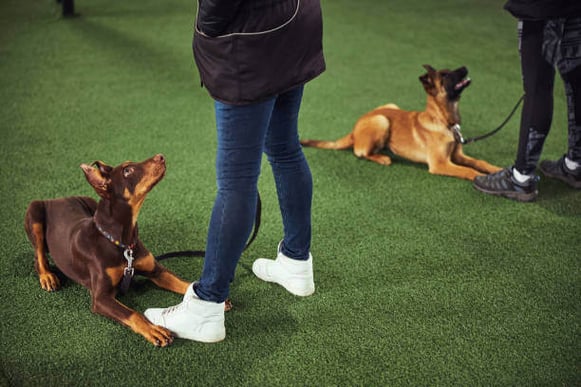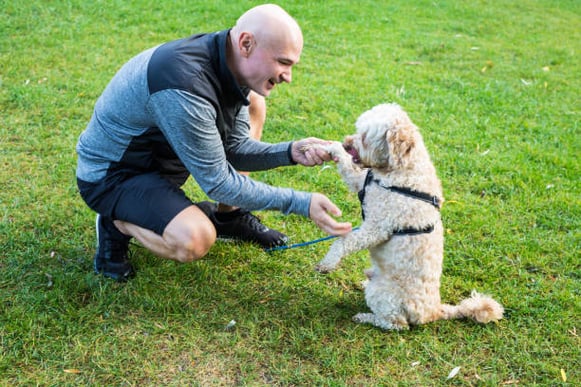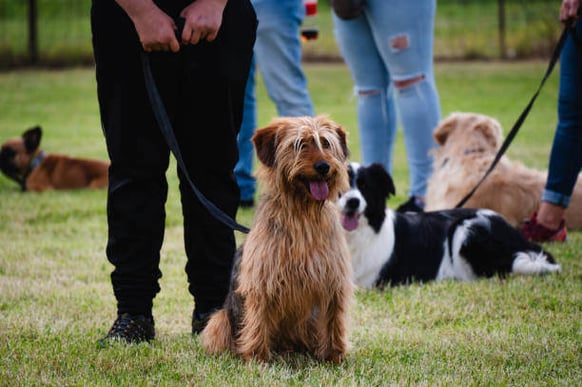Is your pet-care business ready to level up? Offering dog training classes could be the game-changer you’ve been looking for.
With more pet parents seeking professional training, adding this service can transform your daycare or kennel facility into a one-stop shop for all their needs. Hosting training classes helps in other ways too: increasing client loyalty, attracting new customers, and positioning your business as a well-rounded, professional pet-care provider.
Ready to get started? In this blog, we’ll explore the benefits of hosting training classes and guide you through implementing them at your facility.
Why Offer Dog Training Classes?
 Offering dog training classes can bring numerous advantages to your pet-care business. Training classes provide an additional income stream beyond your regular daycare or boarding services, boosting your revenue without requiring significant changes to your existing facility. Pet parents who already trust you with their pets will appreciate the convenience of training classes at the same location and be loyal to your business.
Offering dog training classes can bring numerous advantages to your pet-care business. Training classes provide an additional income stream beyond your regular daycare or boarding services, boosting your revenue without requiring significant changes to your existing facility. Pet parents who already trust you with their pets will appreciate the convenience of training classes at the same location and be loyal to your business.
In addition to retaining current clients, training classes can attract new ones. They act as a unique selling point that differentiates your business from competitors. By offering a variety of classes for different skill levels, you can appeal to a broader range of pet parents searching for professional training. Furthermore, well-trained dogs are easier to manage during daycare or boarding stays, helping to create a safer and more enjoyable environment for all dogs in your care.
Steps to Hosting Dog Training Classes
Successfully integrating dog training into your existing business requires careful planning and execution. Start by identifying the types of training you want to offer. This could range from basic obedience training for puppies to more advanced behavioral classes for older dogs. Consider the needs of your current clients and the demand in your area.
Some potential offerings might include:
- Puppy training focused on basic commands and socialization
- Basic obedience training for all ages
- Behavior modification for specific issues like separation anxiety or reactivity
- Agility training for physical and mental enrichment
Offering a variety of classes ensures that you can meet the diverse needs of your clients and attract a wider audience.
Hire or Partner with a Professional Trainer
 A qualified, experienced dog trainer is essential to the success of your classes. You can either hire a trainer to work directly with your business or partner with a freelance trainer who can lead the classes on-site. It’s important to verify the trainer’s credentials, experience, and teaching methods to ensure they align with your business’s values and standards.
A qualified, experienced dog trainer is essential to the success of your classes. You can either hire a trainer to work directly with your business or partner with a freelance trainer who can lead the classes on-site. It’s important to verify the trainer’s credentials, experience, and teaching methods to ensure they align with your business’s values and standards.
Look for trainers who have certifications from reputable organizations, use positive reinforcement techniques, and have experience working with a variety of breeds and temperaments. Partnering with the right trainer helps establish your business as a trusted provider of high-quality training services, boosting both your reputation and customer satisfaction.
Prepare Your Facility
To host dog training classes, your daycare or kennel facility needs to be prepared to accommodate both the dogs and pet parents. Designate a specific area for the training classes that is separate from the main daycare or boarding spaces to minimize distractions. The training area should be spacious enough to allow for comfortable movement, secure to prevent dogs from running off, and equipped with any necessary tools or equipment.
For example, depending on the training offered, you may need agility obstacles, barriers, or mats. Keep all equipment safe, clean, and well-maintained. Properly preparing your facility helps create a professional environment, ensuring a positive experience for both clients and their pets.
Schedule Classes at Convenient Times
Scheduling your classes thoughtfully is key to attracting and retaining clients. Consider the availability of your target audience when planning class times. Many pet parents prefer evening or weekend sessions since they may be unavailable during regular business hours. Offering a variety of class times accommodates different schedules and maximizes attendance.
 For instance, weeknight classes can cater to busy professionals, while weekend sessions might appeal to families with more flexible schedules. Additionally, offering private lessons or drop-in sessions could provide added convenience for clients with unpredictable availability. By tailoring your schedule to your clients' needs, you increase the likelihood of filling your classes consistently.
For instance, weeknight classes can cater to busy professionals, while weekend sessions might appeal to families with more flexible schedules. Additionally, offering private lessons or drop-in sessions could provide added convenience for clients with unpredictable availability. By tailoring your schedule to your clients' needs, you increase the likelihood of filling your classes consistently.
Promote Your Training Classes
Effective marketing is essential to filling your training classes. Utilize a mix of online and offline marketing strategies to spread the word. Social media platforms like Facebook and Instagram are great for sharing updates, photos, and videos of your training classes. Highlight success stories and show potential clients the positive results they can expect.
Additional promotional strategies include:
- Sending out email newsletters to your existing client base, offering special promotions or discounts for signing up for a class.
- Displaying flyers or posters in your facility, ensuring clients are aware of the new services.
- Encouraging staff to mention the training classes to clients during drop-off and pick-up times.
Promoting your classes through multiple channels provides maximum visibility to attract a steady stream of participants.
 Adding dog training classes to your daycare or kennel facility can be a powerful way to enhance business.
Adding dog training classes to your daycare or kennel facility can be a powerful way to enhance business.
Not only does it open up new revenue streams and boost client satisfaction, but it also sets you apart as a comprehensive pet-care provider. By selecting the right training options and team, scheduling classes thoughtfully, and promoting them effectively, you'll elevate your business and solidify your reputation in the industry.
Expanding services is simple with Gingr. Demo our powerful pet-care software today!


